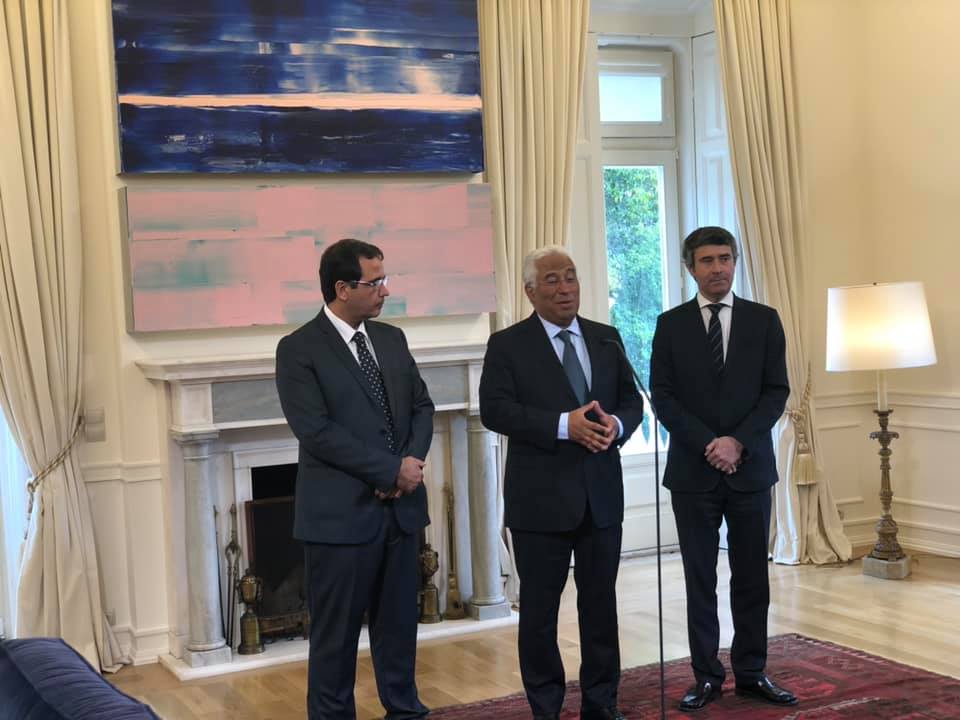Lisbon, 07 May 2019 (Lusa) – Prime Minister António Costa proposed today the holding of a special Council of Ministers at the end of May with the participation of representatives of the Portuguese Communities, said the Secretary of State for the Portuguese Communities.
According to José Luís Carneiro, the proposal was presented today by the prime minister during an official lunch in São Bento, with representatives of the thematic commissions of the Council of Portuguese Communities (CCP), which are meeting in Lisbon.
The idea, José Luís Carneiro explained to Lusa news agency, is to coincide the special meeting of the Government with the annual meeting of the Permanent Council of the CCP, scheduled for May 29, 30 and 31, in the Assembly of the Republic.
“There is a potential of the Portuguese communities on which it begins to create a collective conscience that justifies the proposal of the prime minister so that at the end of the month, when the Permanent Council meets, to make a Council of Ministers in which we can deal with matters [ of the communities] transversal to the Portuguese public administration, “he said.
José Luís Carneiro, who had a brief meeting with the members of the thematic committees, recalled that the Secretary of State for the Communities follows “many areas of public administration … and that there is a set of cross- consular and diplomatic sphere abroad, but much to the conditions of interaction and effectiveness in the response of the entire State administration to the Portuguese who are abroad. “
Examples include tax, social security, education or issuance of documents such as a passport or a citizen’s card.
- Fadista Sara Correia Performs at 2023 Lowell Folk Festival
- An Evening of Fado with Maria Emília and Helder Moutinho in Lowell, MA
- Fado Museum, in Lisbon, inaugurates “Celeste” exhibition, a tribute to fado singer Celesta Rodrigues (1923-2018)
- INTERVIEW: “Ice Merchants” Producer Needs Funding for Final Step Toward the Oscars
- Portuguese communities in North America reject SATA’s “abusive” prices
António Costa’s proposal was welcomed by the chairman of the Permanent Council and Brazilian adviser, Flávio Martins, also present at the meeting of the thematic commissions in Lisbon.
“We thought the idea is great… There are matters that are not only associated with the [Foreign Ministry] itself, and neither the Secretariat of State for the Communities]” said Flávio Martins.
He maintained, therefore, that this will be “an opportunity to carry the reflections” of emigration representatives “to other offices, ministries, and secretariats.”
“It may not work out, but I think it would be easier to get answers faster,” he added, noting that this is an idea that has long been spoken within the CCP itself.
He maintained, therefore, that this will be “an opportunity to carry the reflections” of emigration representatives “to other offices, ministries secretariats”.
Consisting of Portuguese residents abroad, the CCP is the Government’s advisory body for policies related to emigration and the Portuguese communities, and the Permanent Council is organized in a high-level body, regional sections, and three thematic commissions.
Ver Artigo em Português
Costa quer fazer Conselho de Ministros especial com representantes das Comunidades Portuguesas
Lisboa, 07 mai 2019 (Lusa) – O primeiro-ministro, António Costa, propôs hoje a realização, no final de maio, de um Conselho de Ministros especial com a participação de representantes dos emigrantes portugueses, disse hoje o secretário de Estado das Comunidades.
A ideia, explicou José Luís Carneiro à agência Lusa, é fazer coincidir a reunião especial do Governo com o encontro anual do Conselho Permanente do CCP, agendado para os dias 29, 30 e 31 de maio, na Assembleia da República.
“Há um potencial das comunidades portuguesas sobre o qual se começa a criar uma consciência coletiva que justifica a proposta do primeiro-ministro para, no fim do mês, quando se reunir o Conselho Permanente, fazer um Conselho de Ministros em que possamos tratar assuntos [das comunidades] transversais à administração pública portuguesa”, disse.
José Luís Carneiro, que manteve um breve encontro com os membros das comissões temáticas, lembrou que o secretário de Estado das Comunidades acompanha “muitas áreas da administração pública […] e que há um conjunto de matérias transversais que não dizem respeito apenas à esfera consular e diplomática no estrangeiro, mas muito às condições de interação e de eficácia na resposta de toda a administração do Estado aos portugueses que estão no exterior”.
Como exemplos apontou as questões fiscais, da segurança social, do ensino ou da emissão de documentos como o passaporte ou cartão de cidadão.
A proposta de António Costa foi bem acolhida pelo presidente do Conselho Permanente e conselheiro do Brasil, Flávio Martins, também presente na reunião das comissões temáticas em Lisboa.
“Achamos a ideia ótima…]. Há matérias que não estão associadas apenas ao próprio ministério [dos Negócios Estrangeiros] quanto mais à secretaria [de Estado das Comunidades]”, disse Flávio Martins.
Sustentou, por isso, que esta será “uma oportunidade para levar as reflexões” dos representantes da emigração “aos outros pelouros, ministérios e secretarias”.
“Pode ser que não dê em nada, mas penso que ficaria mais fácil obter respostas mais rápidas”, acrescentou, lembrando que está é uma ideia que há muito era falada dentro do próprio CCP.
Composto por portugueses residentes no estrangeiro, o CCP é o órgão consultivo do Governo para as políticas relativas à emigração e às comunidades portuguesas e está organizado num órgão de cúpula, o Conselho Permanente, secções regionais e três comissões temáticas.
CFF // JH
Lusa/Fim


